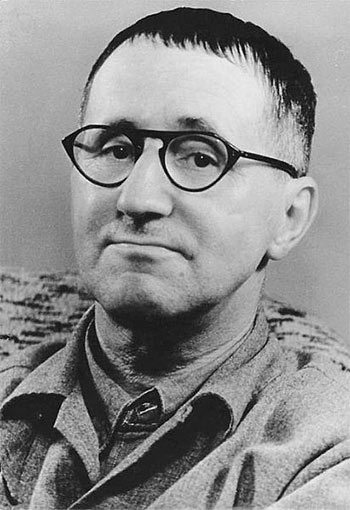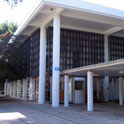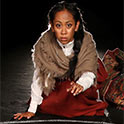— ON THE SUBJECT

Sarah Canero. Photo Credit: Tim Matheson
“Terrible is the seductive power of goodness!!"
warns Bertolt Brecht's amiable narrator. In the heat of civil war a servant girl sacrifices everything to protect an abandoned child. Their subsequent misadventures across her war-torn country become the heart of Brecht's playful parable, which calls into question our basic assumptions of right in a world that has gone wrong.
“Brecht's 1945 adaptation of the Chinese play The Chalk Circle, written in 1300, speaks more directly to today's culture than do most modern political plays." – Backstage
Bertolt Brecht was a German playwright, director, poet and theorist. He is widely considered to be one of the most influential western theatre practitioners of the twentieth century. Brecht believed that theatre could be a space where audiences might recognize, analyze and critique social structures. His techniques encouraged an active and attentive audience that is aware of the fact they are watching a play.
Director Stephen Heatley has worked in professional theatre for over 40 years. During his 12 years as Artistic Director of Theatre Network in Edmonton, he directed over 30 world premieres. He also directed outdoor productions of Shakespeare for the Free Will Players from 1991-1995. Before arriving at UBC in 1999, he spent five years as Associate Artistic Director of the Citadel Theatre where he ran the Theatre School and directed in each of the theatre’s performance spaces. Stephen is a recent recipient of the Dorothy Somerset Award for Development in the Performing Arts.
This production features an original composition and sound design by UK based artist Richard Link. He has written the score for over 20 musicals and the music/sound design for over 60 plays. Most recently Richard wrote the music for The Book of Jobes by Heidi Janz, presented by Fire Exit Theatre in Calgary. Richard lives in London, England where he lectures in Musical Theatre at the London College of Music.
The acting ensemble includes BFA Acting students Sarah Canero, Morgan Churla, Lara Deglan, Mercedes de la Zerda, Sarah Harrison, Luke Johnson, Kat McLaughlin, Daniel Meron, Nick Preston, Nicole Sekiya, Bethany Stanley, Naomi Vogt and Natasha Zacher. The creative team includes BFA English Literature/Theatre Design student Molly Lai (Set), BFA Theatre Design students Laura Fukumoto (Costumes) and Scott Zechner (Lighting).
THE CAUCASIAN CHALK CIRCLE, By Bertolt Brecht, Original music by Richard Link Director Stephen Heatley Sept. 19 – Oct. 5, 2013 | Telus Studio, Chan Centre for the Performing Arts 6265 Crescent Rd., UBC | bit.ly/lN0qL2 | CURTAIN: 7:30 pm | TICKETS: Reg. $22/Senior $15/Student $10/Groups $2 off ~ plus service charges | $7 Preview Sept. 18 | Talk Back: Wed. Sept 18 | BOX OFFICE: 604.822.2678 or box.office@ubc.ca | Book Online: http://ubctheatre.universitytickets.com | MORE: www.theatre.ubc.ca
About the Playwright: Bertolt Brecht

Bertolt Brecht
What is justice? This is one of the oldest questions in Western cultural history. At least since Plato’s Republic, people have debated what real justice could be and how we might recognize it if it occurred. In one of his most famous plays, The Caucasian Chalk Circle, Bertolt Brecht explores the question and, in a characteristically bittersweet statement, claims to have shown “a brief golden age/Almost an age of justice.” He wrote the play in 1944, towards the end of his American exile. The play itself says that it is a retelling of a Chinese play, called “Circle of Chalk” from the 14th century by Li Xingdao. But it is also clearly a retelling of the story of the “Judgment of Solomon,” from the Old Testament. Brecht weaves together sources from disparate cultures to create a tale about the flickering possibility of justice. The new production by Stephen Heatley attempts to capture the hope, sympathy, irony and range of Brecht’s vision.
Of course Brecht never presents his arguments directly. Although traditional theatre tries to get the audience to identify with its characters emotionally, Brecht uses many ways to distance the audience and remind us that this is theatre, a performance, a show. One example is the use of a “Story Teller,” someone who begins each scene and offers his comments throughout on the tale. At a pivotal moment in Scene 1, Grusha the kitchen maid takes pity on Michael, the noble child left behind by his parents and stays with him. The Story Teller comments: “Terrible is the seductive power of goodness!” These comments turn the play into more of a fable. Besides the Story Teller there are a chorus and many songs, and for this production there is an entire new score. The devices of Brecht’s “epic theatre” become techniques for surprise and juxtaposition.
For Brecht it is clear that justice
occurs only by lucky chance
Grusha leaves the city with Michael and escapes to the mountains. Her journey is difficult. Ultimately she meets her former lover, Simon, but the two are powerless to stop the soldiers from taking the child away. Though she had raised him, Grusha must face a trial for stealing him. The second part of the play involves the story of the judge, Azdak. He is poor and drunk at first. Gradually he comes into power and must judge Grusha. Despite his corruptibility, Azdak makes a wise decision. For Brecht it is clear that justice occurs only by lucky chance. Our institutions cannot be relied on for anything but decisions based on power. Nevertheless, he derives an important message for the audience to consider. As the couples dance off and Azdak disappears, the Story Teller says: “Take note of what men of old concluded:/That what there is shall go to those who are good for it,/The children to the motherly, that they may prosper.” For a brief moment, Brecht allows the possibility of a more rational organization of society to appear. As he wanted inscribed on his gravestone, “He made suggestions.”
Dr. Steven Taubeneck
Department of German and Philosophy
Univerisity of British Columbia
Dr. Steven Taubeneck has been a faculty member in German and Philosophy at UBC since 1992. He has worked with several productions in the Theatre Department, and previously worked on Brecht’s theatre as well. His teaching and research interests include German theatre, German cultural history, existentialism and continental philosophy since Hegel.
Director's Notes: Stephen Heatley

Stephen Heatley
Many years ago in another lifetime, I had the good fortune to work with the text of The Caucasian Chalk Circle at an inspired and inspiring summer theatre school for teenagers. Those three weeks of exploration with my teaching colleagues and the brilliant students made me fall in love with Brecht and Brecht’s theatrical ideas. I have been looking for an opportunity to engage with this play as a director ever since. Two other brief theatrical encounters solidified my interest in tackling this playwright’s work. In the late 90s, Ute Birnbaum, a director who had worked with Brecht in Berlin in the 50s, was staging a production of The Threepenny Opera in Edmonton. She held a workshop for the local theatre community and someone asked for her take on the notorious verfremdungseffekt or “alienation effect” (so named in English in the 60s by the critic, John Willett, now more often referred to as “distancing”). This is an idea that seemed to have baffled theatre practitioners for decades. She looked a little puzzled by everyone’s rapt interest in the question and said, simply, “Well, Brecht was interested in surprises”. Hmmmm. When I first arrived at UBC, we had a guest visit us from the Berliner Ensemble, Holger Teschke. Over lunch one day, I asked him to comment on the density of Brecht’s theoretical writings and why they seemed so difficult to cut through. (I had tried as a graduate student!) He laughed and said that Brecht wrote in such a confusing way to obfuscate his interest in socialism during times when this would have been dangerous in Germany. So, with two small interchanges, the complexity of Brecht’s theories suddenly seemed manageable.
So, why The Caucasian Chalk Circle today?
Two reasons -
artistic and pragmatic.
So, why The Caucasian Chalk Circle today? Two reasons - artistic and pragmatic. The disparity between those with money and those without that so interested Brecht in the mid 20th century is, again, front and centre in our consciousness. The Occupy Movement that dominated the news two years ago, the recent student protests in Quebec, the First Nations’ Idle No More Movement - all are clear indications that things have gotten worse rather than better for the disenfranchised. The kind of civil disobedience that Brecht asks us to consider in The Caucasian Chalk Circle makes some sense today. Also, this play was chosen to feature the talents of the graduating class of our BFA in acting, so we were looking for an ensemble show that could support 10 women and 3 men. Brecht’s encouragement to show the mechanics of theatrical production said to me that he would not disapprove of women playing men and men playing women. So here we are.
We are very fortunate to have a brand new score created for our production by my long-time friend and collaborator, Richard Link, and to have had him with us since the beginning of rehearsals to guide us musically. Brecht was a big fan of the theatricality of music and Richard’s score is full of twists, turns and surprises. I am confident that Brecht would have approved.
Thanks for your support of Theatre at UBC.
— Interview with the Composer: Richard Link

Richard Link
How did you get involved in UBC’s production of The Caucasian Chalk Circle?
Stephen Heatley mentioned he was directing The Caucasian Chalk Circle and I suggested that he use the score I wrote for a production 25 years ago. He thought this was an excellent idea and we began discussing the project.
This isn’t the first time you’ve composed music for one of Brecht’s plays. Previously, you’ve composed music for Mother Courage and The Caucasian Chalk Circle. Can you speak to the opportunities and challenges posed by composing for Brecht’s work?
Each Brecht play presents a unique world view that needs to be expressed through the music. At the same time Brecht plays, similar to those of Shakespeare, present composers with an unlimited number of possibilities in regards to stylistic choices. The challenge is to create a score that expresses the vision of the director, serves the needs of the play, is appropriate for the skill level of the actors/musicians and is interesting musically. For past Brecht productions I have created scores that use a more ‘traditional’ German expressionistic sound (think Kurt Weill or Paul Dessau – two of Brecht’s most famous collaborators) as well as more modern scores that incorporate contemporary styles of music.
Brecht famously said that music is what “made possible something which we had long since ceased to take for granted, named the ‘poetic theatre.’” Can you speak to your artistic process for UBC’s production of The Caucasian Chalk Circle?
Before I began composing, Stephen and I decided that the students would not only sing they would also provide their own accompaniment. We also decided that while the play calls for one ‘singer’ we wanted to create a vocal ensemble. (The singing in our production is split between all of the students and I have used as many different vocal combinations as possible.) I therefore needed to compose music that was appropriate for their skill level and that utilized all of their musical talents. To do this I met with the students in April.
Whereas many Brecht productions use music
that imitates the German expressionistic sound
that was popular during Brecht’s life,
I wanted to create a score
that reflected the eclectic sound world of the students.
I also wanted to write a score that was musically accessible to the students. Whereas many Brecht productions use music that imitates the German expressionistic sound that was popular during Brecht’s life, I wanted to create a score that reflected the eclectic sound world of the students. Thus the score is stylistically very diverse and filled with the sounds of brass, ukuleles, guitars, piano and percussion. (Though I can’t be certain I feel that Brecht would have approved of this very utilitarian approach to the music.)
Each scene of the play has a very distinct feel and purpose. This inspired me to create sound worlds (style, harmonic and melodic language) that reflect the unique nature of each scene.




